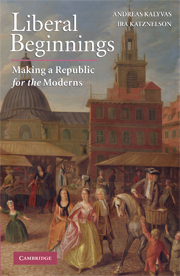Book contents
- Frontmatter
- Contents
- Acknowledgments
- 1 Beginnings
- 2 The Rhetoric of the Market: Adam Smith on Recognition, Speech, and Exchange
- 3 Agonistic Liberalism: Adam Ferguson on Modern Commercial Society and the Limits of Classical Republicanism
- 4 After the King: Thomas Paine's and James Madison's Institutional Liberalism
- 5 Embracing Liberalism: Germaine de Staël's Farewell to Republicanism
- 6 On the Liberty of the Moderns: Benjamin Constant and the Discovery of an Immanent Liberalism
- 7 After Republicanism: A Coda
- Index
- References
1 - Beginnings
Published online by Cambridge University Press: 05 September 2012
- Frontmatter
- Contents
- Acknowledgments
- 1 Beginnings
- 2 The Rhetoric of the Market: Adam Smith on Recognition, Speech, and Exchange
- 3 Agonistic Liberalism: Adam Ferguson on Modern Commercial Society and the Limits of Classical Republicanism
- 4 After the King: Thomas Paine's and James Madison's Institutional Liberalism
- 5 Embracing Liberalism: Germaine de Staël's Farewell to Republicanism
- 6 On the Liberty of the Moderns: Benjamin Constant and the Discovery of an Immanent Liberalism
- 7 After Republicanism: A Coda
- Index
- References
Summary
At a challenging time marked by global transformations and political uncertainty, and at a moment when modern liberalism has discredited one enemy and is embattled with another, its history, character, and prospects have become ever more urgent. The relationship between republicanism and liberalism, which emerged as a central issue for historians of modern political thought some decades ago, presently can aid such a consideration.
At first, this subject defined an important axis of debate among political historians, especially as they discovered republicanism as an alternative to the liberal tradition in colonial America and the early republic. Studies of the links joining liberalism to an older republicanism then migrated to political theory and to comparative, cross-national investigations. Animated by strong normative motivations, these works have taken what is, by now, a familiar form, where one or the other is endorsed as the superior doctrine and as a better guide to contemporary politics and society. Speaking directly to the standing and possibilities of liberalism today, such discussions consider a range of issues that include tensions joining virtue and self-interest, the common and the personal, sovereignty and representation, authority and freedom, law and ethics.
We contribute to this ongoing conversation by way of a historical and textual strategy. In coming to terms with liberal beginnings, we examine the association – or is it a bond? – connecting liberalism and republicanism. We revisit the origins and development of liberal thought to think about how it ascended, despite many challenges, to today's leading position.
- Type
- Chapter
- Information
- Liberal BeginningsMaking a Republic for the Moderns, pp. 1 - 17Publisher: Cambridge University PressPrint publication year: 2008
References
- 1
- Cited by



